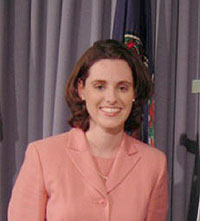
|
March 2006 Victoria Marple Cobb ('00) Lobbies Legislators to Uphold Traditional Family Values Legislators listen when Victoria Marple Cobb (’00) lobbies the Virginia General Assembly on issues that affect the family. Despite her relative youth, the twenty-seven-year-old executive director of The Family Foundation, a nonprofit organization committed to protecting traditional family values in Virginia, often finds herself at the center of public policy debates on family-related issues such as abortion, the marriage amendment and school choice. Cobb knew from an early age that she wanted to advocate on behalf of families, and she credited her grandmother for instilling a sense of political activism in her. “My grandmother became politically active as an outcome of her faith,” Cobb said. “She became a motivator and model for me. I remember handing out flyers with her when I was a young child in support of Reagan’s 1984 reelection campaign.” Cobb chose her majors in leadership studies and political science with her future career in mind and selected her internships with intentionality as well. She completed her Jepson internship during the summer of 1999 with the Family Research Council, a national nonprofit organization dedicated to protecting and promoting traditional Judeo-Christian concepts of marriage and family. In spring 2000 during her senior year, she interned with The Family Foundation, one of the nation’s oldest family policy councils operating on the state level. And in her Jepson senior thesis, Cobb examined how an individual’s faith could effect societal change. Following her 2000 graduation, Cobb went to work for a family policy council in Kentucky with ties to the Family Research Council. But she returned to Virginia four months later when a job as policy analyst with The Family Foundation opened up. In this role, Cobb did a lot of research and writing and got her first taste of lobbying in front of the Virginia General Assembly. Cobb demonstrated an aptitude for lobbying and rose quickly through the ranks of The Family Foundation. In summer 2001 she became the director of legislative affairs, a job that entailed strategic planning, bill drafting and lobbying, and in November 2004 she became executive director, the organization’s top leadership position. “People notice that I’m young to be in a leadership position,” Cobb said, “but I think my education and work experiences prepared me. I use what I learned as a political science major in my lobbying efforts and what I learned as a leadership studies major in my management of The Family Foundation.” As executive director, Cobb focuses her attention on lobbying during the months of January, February and March when the General Assembly is in session. The rest of the year she concentrates on organizational management, strategic planning and fundraising. The Richmond Times-Dispatch frequently quotes Cobb on some of the most controversial issues facing the Virginia General Assembly. Recently, for example, Cobb successfully lobbied the House on behalf of The Family Foundation to approve legislation requiring public libraries to provide Internet filters. The Senate will debate the bill soon, and Cobb expressed optimism regarding the bill’s passage. She celebrated a victory last spring in the wake of the Laci Peterson trial with the passage of Virginia’s fetal-homicide bill, which created a separate legal penalty for anyone who injures or kills an unborn child during an attack on the mother. Cobb is currently lobbying members of the General Assembly to vote for legislation that supports and protects traditional marriage. The Family Foundation also continues to play an active role in the abortion debate. Cobb counts among its victories the passage of legislation in 2001 requiring informed consent and a 24-hour waiting period for women requesting an abortion. Providing equal educational opportunities to all children in Virginia ranks as another priority of The Family Foundation, Cobb said. “If you are low income in Virginia, you’re stuck with your district’s school,” Cobb said. “We are pushing for a tax break for businesses that are willing to provide scholarships to give low-income kids the ability to choose something different.” Although the No Child Left Behind Act helps somewhat, according to Cobb, it generally comes into play when a school has received failing grades. It doesn’t help in situations where a school passes its state-mandated assessment but fails to meet an individual child’s needs, Cobb explained. “Every child’s needs can’t be met by a cookie cutter system,” she said. “Virginia is one of the worst states in the nation in terms of educational freedom.” Much of The Family Foundation’s legislative success derives from its well-organized network of strong local grassroots groups. Despite its relatively small size—it has an operating budget of only $500,000 and a full-time staff of five, which swells to nine when the General Assembly is in session—it wields a lot of political clout. Cobb’s dedicated, passionate focus on issues affecting the family helps drive the organization’s political agenda. In addition to her challenging job at The Family Foundation, Cobb will soon be taking on another full-time job—that of mother. She and husband Matthew Cobb, a 1998 Jepson graduate and an assistant attorney general for Virginia, are expecting their first child in July. Family issues, already so important to Cobb, will undoubtedly become even more so. |
